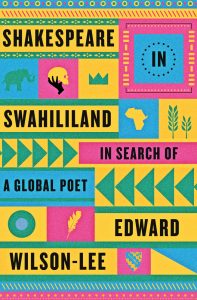For centuries, Shakespeare’s plays have easily accommodated shifts in cultural fashion, from the happy ending tacked on Romeo and Juliet in the 18th century to Laurence Olivier’s ultra-Freudian Hamlet in the 20th. Granted, both of those were pretty terrible ideas, but they demonstrated Shakespeare’s ability to speak to the values and anxieties of any age. And he needn’t necessarily even speak in his own tongue: The 21st-century fashion is for multicultural Shakespeare, as exuberantly showcased in 2012 at London’s World Shakespeare Festival, which ran the gamut from The Comedy of Errors performed in Dari Persian to King Lear recast as a Belarusian folktale. These productions shift the focus from Shakespeare’s language to his stories and his largeness of spirit. They affirm that his plays have room for Hindi love songs or a Maori war dance, that he is indeed “the universal genius of man” touted by the British explorers who carried Shakespeare with them into the jungles of 19th-century Africa.

This 21st-century Shakespeare is not at all the sort of universal genius those explorers had in mind, Edward Wilson-Lee reminds us in his probing new book, Shakespeare in Swahililand: In Search of a Global Poet. For men like Henry Morton Stanley and Richard Francis Burton, the playwright was an exemplar of Western cultural supremacy, a corollary to the assumption of racial superiority that allowed Europeans to describe their grab for African land and resources as a mission to bring white civilization to the benighted Dark Continent.
The explorers read Shakespeare in their tents at night “to conjure away the chaos, depravity, and existential nihilism that lay just at the doorstep of Victorian confidence,” Wilson-Lee writes. The Tempest fueled their fantasies of dark-skinned savages like Caliban, who believes that Prospero’s power lies in his magic books and plots to burn them. When a group of Congo tribespeople did in fact demand that Stanley give them his notebook to be burned as “witchcraft”—demonstrating nothing more surprising than the suspicion of written note-taking in a society that imparted knowledge orally—he claimed in an 1877 newspaper article that he fooled them by handing over his volume of Shakespeare instead. It wasn’t true (he instead provided a sheet of paper with a few scribbled words), but in Wilson-Lee’s assessment of Stanley’s revision, “the mythic balance of the tale required the sacrificial victim to be Shakespeare…those who do not appreciate him are, by extrapolation, in some sense not human.”
“This was,” the author goes on to admit, “a depressing place to start my quest to understand Shakespeare’s universal appeal.” Happily for him, and his readers, this is not where the story ends. The unexpected information that launched Wilson-Lee on his quest—that one of the first books printed in Swahili was an 1867 translation of selections from Charles and Mary Lamb’s Tales from Shakespeare—proves to be more typical of the complicated, nuanced history he uncovers as he travels across East Africa, where Swahili serves as a common language and Shakespeare served a generation of African revolutionaries as a weapon in their struggle for independence.
Edward Steere, the English missionary who printed Hadithi za Kiingereza (Tales from the English) in Zanzibar, chose an odd assortment of four plays with the intent, Wilson-Lee plausibly speculates, of giving his yet-to-be-converted audience Shakespeare’s “clearest parables for everyday life…messages that Steere might have expected to be acceptable to readers in an Islamic society.” Mind you, The Taming of the Shrew is not exactly a straightforward argument for women submitting to their husbands, and King Lear is about a lot more than the evil effects of children wielding power over parents; nor do The Merchant of Venice and Timon of Athens, the other two plays selected, teach unambiguous lessons about the evils of usury or the transience of earthly possessions. Shakespeare is slippery, and the same play that gave white explorers their vision of superstitious, violent natives who deserve to be enslaved could be turned by 1969 into Une tempête, a radically anti-colonial version that recast Caliban as a freedom fighter.

This process fascinates Wilson-Lee, who was raised in Kenya by Western-born conservationists and is now a fellow in English at Cambridge University. Some colonial subjects may have professed their love for Shakespeare simply “to curry favor with the British ruling class,” he acknowledges, but he refuses to accept this as the whole truth: “My experience of teaching Shakespeare has been that he, almost alone among writers, defies such cynicism.” The English may have made Shakespeare a centerpiece of the colonial curriculum through which they trained natives for service to the British Raj in India, but that doesn’t explain why Indian workers imported to build the railways of East Africa in the early 20th century made Mombasa a center for Shakespearean performance as busy as Stratford-upon-Avon, albeit in Indian-language adaptations that freely altered plots and encouraged a flamboyant acting style that made European observers cringe.
Africans too made their own uses of Shakespeare. James Ngugi, a student at Kenya’s elite Alliance Boarding School in the 1950s, equated the band of woodland exiles in As You Like It with the Mau Mau rebels, including his older brother, who were battling British rule from camps in Kenya’s northern highlands. The roster of students reading and performing Shakespeare at Kampala’s Makerere University in the 1940s was virtually a who’s who of the African independence movement, including the first presidents of independent Uganda and Tanzania. The former, Milton Obote, played Caesar while organizing protests against the Ugandan puppet regime; the latter, Julius Nyerere, spent the 1960s crafting a socialist government by day and translating Julius Caesar and The Merchant of Venice at night. His aim, contemporaries agreed, “was to demonstrate Swahili’s capacity to serve as a great literary language.”
Wilson-Lee primarily focuses on Shakespeare as literature, though he provides a few marvelous descriptions of African performances, such as the versions of Othello, Macbeth and Hamlet staged by translator/director Tsegaye Gabre-Medehin in Ethiopian costumes that scandalously spotlighted their political implications for Haile Selassie’s dying monarchy. Theatre lovers who wish for more of this kind of material should search out Andrew Dickson’s Worlds Elsewhere: Journeys Around Shakespeare’s Globe, published earlier this year, which features lively accounts of contemporary Shakespearean productions as well as a good deal of performance history. But Wilson-Lee’s text-centered approach is equally valuable, asking tough questions about the meaning of glib phrases like “universal genius” and taking a hard look at the way even the most magnificent words can be twisted to suit our prejudices and preconceptions.
They can also, as he amply demonstrates, be reclaimed for a more generous vision. “I am struck,” Wilson-Lee writes in his moving conclusion, “by the infinite resourcefulness and variety that readers have brought to their readings of Shakespeare, and by the majestic consistency with which the works have risen to the task…the Shakespeare made in Africa has come to replace the one that was taken there. It is a strange and beautiful renewal: he is much the better for it.” The Victorians adventurers who took him there rightly celebrated Shakespeare as a supreme artist at the pinnacle of Western civilization, but they wrongly assumed he was their sole property. Wilson-Lee’s empathetic analysis of how Africans made Shakespeare their own makes a forceful case that he belongs to all of us.
Wendy Smith is a frequent contributor to this magazine.

